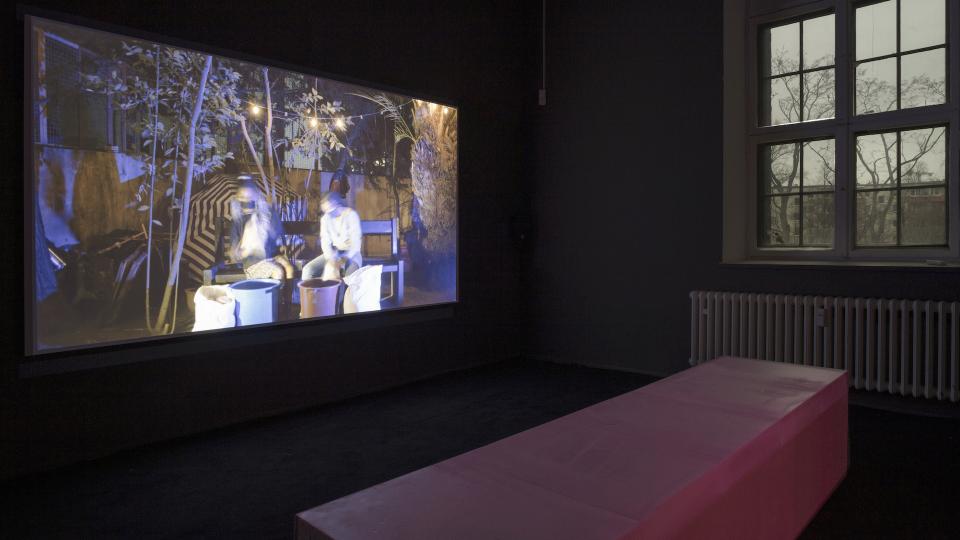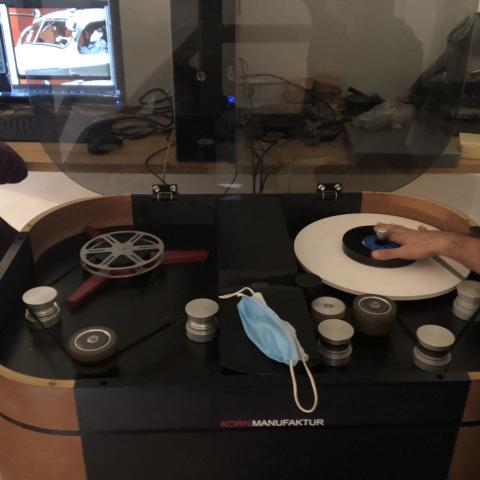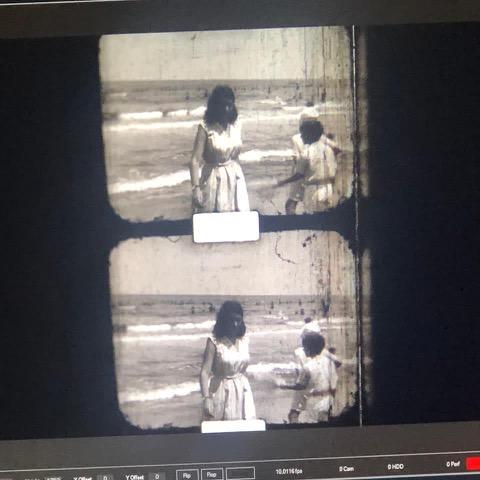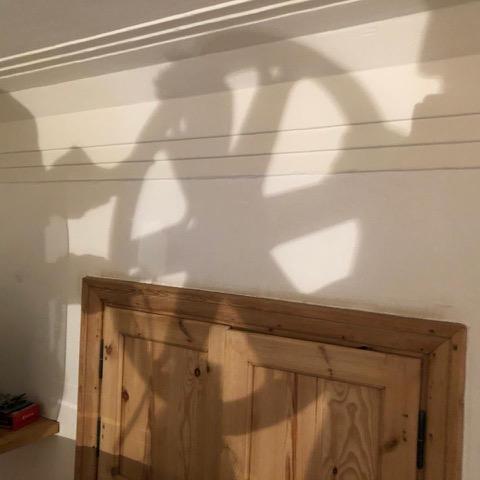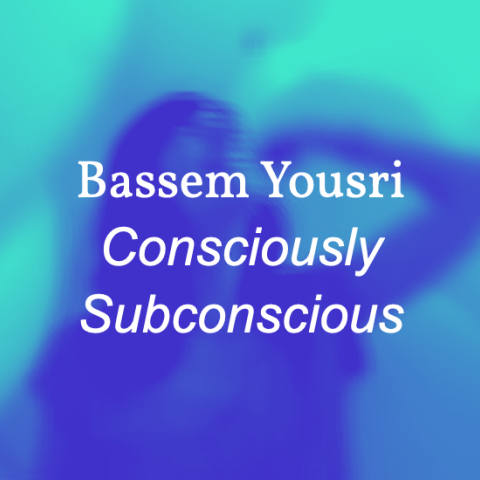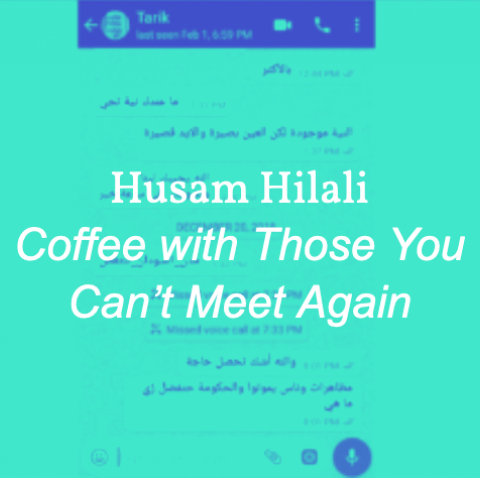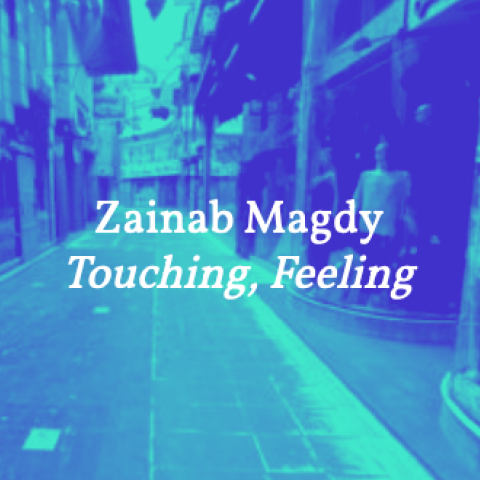Virtuelle Residenzen
2020 war in vielerlei Hinsicht ein herausforderndes Jahr. Die Covid-19-Pandemie forderte viele Opfer und schränkte zugleich das gesellschaftliche sowie kulturelle Leben auf der ganzen Welt ein.
Auch die Martin Roth-Initiative (MRI) musste ihre Arbeit den gegebenen Umständen anpassen. Vor allem strenge Reisebeschränkungen führten zu verschobenen oder ausgesetzten Schutz- bzw. Schaffensaufenthalten. Gleichzeitig wurden weltweit zivilgesellschaftliche sowie künstlerische und kulturelle Handlungsräume pandemiebedingt noch enger. Die Frage, was Gefährdung künstlerischen/kulturellen Schaffens in pandemischen Zeiten bedeutet und wie die MRI trotz der Umstände unterstützen kann, musste neu gestellt werden.
Mit der Unterstützung des Auswärtigen Amtes war es Martin Roth-Initiative möglich, alternative Fördermaßnahmen umzusetzen, die die Handlungsfähigkeit von Kunst- und Kulturschaffenden unter diesen besonderen Bedingungen stärkten. Mithilfe virtueller Residenzen wurden insgesamt 30 Personen in acht Ländern vom 01.10.2020- 31.12.2020 gefördert. Hierzu arbeitete die Martin Roth-Initiative mit Gastorganisationen aus dem Kulturbereich zusammen, die gemeinsam mit ihren internationalen Kolleginnen und Kollegen Projekte im digitalen Raum durchführten.
Eine Auswahl der Projekte finden Sie auf dieser Seite:
-
Living Archive Cairo - arsenal institut für film und videokunst e.v.
-
Overpass - Cashmere Radio e.V.
-
Teaser for Phantom Future- A Virtual Dialogue between Grupo Cena 11 and Kuenstlerhaus Mousonturm - Künstlerhaus Mousonturm
-
1000 Scores-Virtuelle Residenzen - Rimini Protokoll
-
Beyond the Southern Grasslands - SAVVY Contemporary
-
Congress of Idling Persons and The Epoch of Mapulence - Transmediale
Living Archive Cairo
Stimmen und Impressionen aus dem Projekt "Living Archive Cairo"
"Cimatheque Cairo is often framed as a "film archive" and "film center" yet the terms "film archive" and "film center" describe a far more complex world in archiving films and building a community around it than meets the interested public's eye. For this reason, I am happy to have had the opportunity to explore this topic further through the online residency program of Arsenal - funded by MRI. In this three month-program my colleagues and I came across the complex arrangements that make film archives like Cimatheque possible—each one of us from our own points of views (this collaborative aspect was personally very enriching). The experience we had at Cimatheque covered many aspects—from handling the material documents (film, text and photos) to the understanding the importance of preservation tools and scanning technologies to the forging of a community of archival scholars and experts who shared their insights and provided us a space to ask questions." - Ali Atef
"During this pandemic, everything has suddenly become so distant and unclear. But with the help of this online residency we managed to be connected to wonderful people living in different regions. I never felt alone or mislead when my team and I had the honorable chance to be provided with the help and guidance of others. We had the chance to expand our networks and learn more about film archive. Cimatheque’s film archive is a gem found and yet to be discovered. My passion towards films is a beginning to being a film archivist. I particular [sic] the private film collection of Magdy Rafla, which is part of the archive, has taught me knowledge around films shot in and outside of Egypt. As a filmmaker I’ve always been working on personal films of mine but detached from Egyptian film history and other international films produced around the 40’s up to current times. It was a crucial job to access them cautiously and manage to preserve them. I have always practiced the art of meditation on my personal archive, and bringing into display. But I wasn’t aware of other families’ personal archive produced especially around the 40’s and 50’s. Nor was I aware of what can be found in the wardrobe of a film collector. In the beginning I was happily satisfied volunteering in such incredible collection founded by a jeweler past the time I lived in. I learnt how to properly access such material, categorize it, and re-access it with appropriate labeling and dates. I have learnt about the importance of documentation and by time I managed to be more observant and patient. I have learnt how to repair fragile films and as well as clean them for digitization. I learnt and studied about the film’s material based on their smell, color, texture, as well as the film’s origin. I learnt about the correct conditions for storage regarding factors such as temperature, labeling, and sun exposure. I have learnt that films carry a nature that is very alive and sensitive just as human beings. They can get sick and decay, develop a smell known as vinegar syndrome and there are precautions taken to minimize any further damage and bring these films back to life. Our Virtual zoom meetings were successful enough to allow us to practice any practical skills applied taught by professional film archivists in their expertise fields. Communication was easy and well informative. I had the honor to listen to artists, filmmakers, archivists, curators, and professors speak about their passion and knowledge. This was all great inspiration for my team to have proper guidance into working with film archives. As a filmmaker, I aspire to make a film based on the private collection shot by Egyptians back in times founded by Magdy Rafla. I plan to have this archive accessible to the audience whether in a form of library or film programs screened in cinemas and museums. This online program was a necessity to bring us together as a team and bring this archive back to life. Whether it can be accessible to the virtual world or to the real world, hopefully soon." - Dana Enani
In gemeinsamen Workshops mit Arsenal – Institut für Film und Videokunst e.V behandelten die MRI-Stipendiat:innen der Kairoer Cimatheque Fragen rund um das Thema Konservierung und Digitalisierung von Filmarchiven und wie diese in der Gegenwart genutzt werden können.
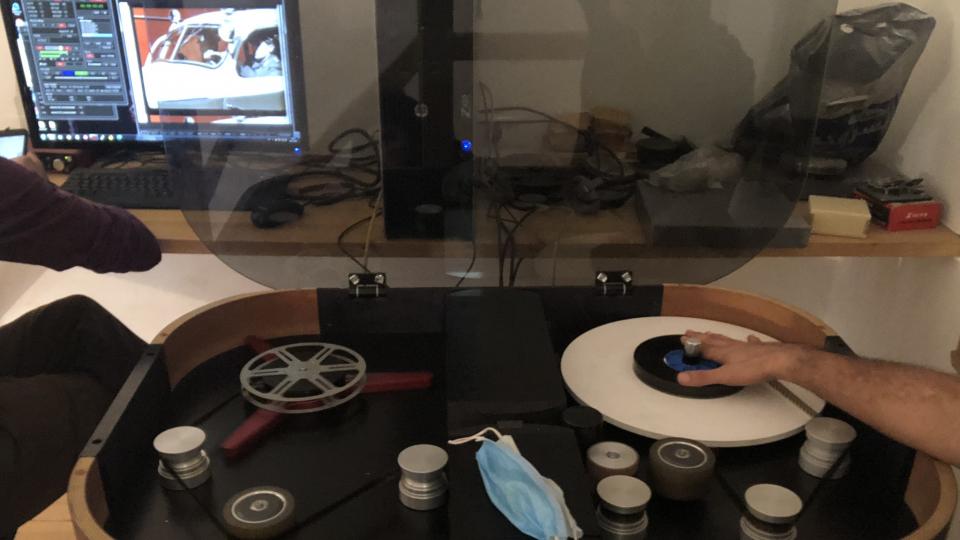
Overpass
Stimmen und Impressionen aus dem Projekt "Overpass“
"Digging for music, especially from the first golden age of Egypt is not always an easy task. Through the virtual residency I managed to take the time to listen carefully to the recorded pieces, find different versions and interpretations, draw parallels between the history of recorded music elsewhere and in other continents, and come up with some conclusions and observations about an exciting yet lost period of Egyptian music." Nadah El-Shazly
Im Rahmen einer von der MRI geförderten virtuellen Residenz in Kooperation mit dem Berliner Cashmere Radio unternahm die Musikproduzentin und Sängerin Nadah El Shazly eine musikalische Recherchereise in ihrem Heimatland Ägypten. Das Ergebnis sind drei Radiosendungen, die Sie durch unterschiedliche Zeiten und Genres führen: Live From Viper Mountain – Cashmere Radio
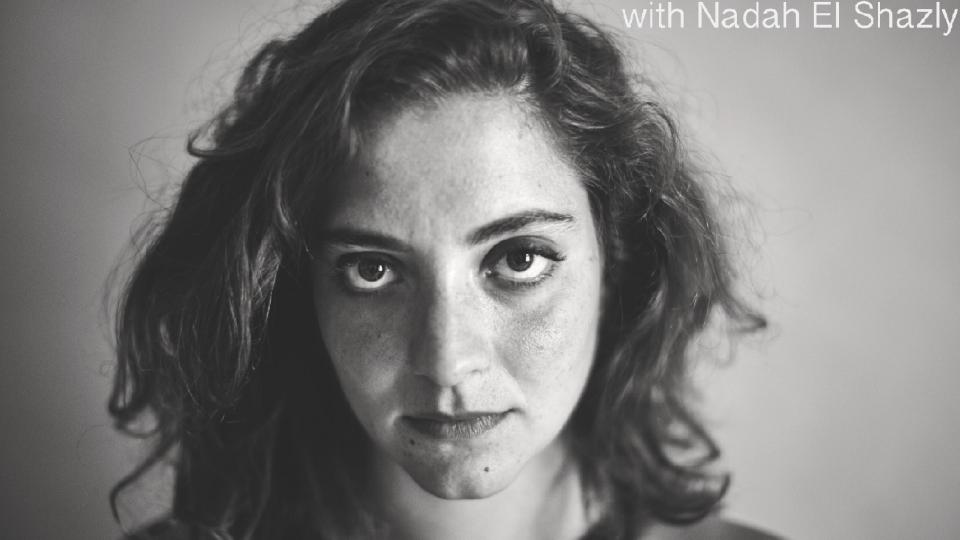
Teaser for Phantom Future
Stimmen und Impressionen aus dem Projekt „Teaser for Phantom Future“
"The realization of the 'Teaser for Phantom Future' residence enabled the continuation of the Cena 11 research linked to the delayed premiere of the play 'Dark Matter', due to the pandemic! In this context, the MRI virtual residencies made it possible to create new technical tools that link the research of emotional skeletal muscle modulation to physical digital body extensions, which aim to create a kinetic dramaturgy that involves technology as an extension of nature. Thus we created the concept and practice of “chaos caption”, a name that baptizes our dialogue and feedback between machine, form, word and transduction! The residency was vital to make the group's continuity feasible and to start the creation of the new hybrid version of Matéria Escura that will be presential and virtual, cultivated during the Project 'Teaser for Phantom Future'' and now migrating to the studio!" - Cena 11
Im Rahmen der virtuellen Residenzen entwickelte die brasilianische Tanzkompanie Cena 11 mit Unterstützung des Künstlerhauses Mousonturm eine neue "kinetische" Performance. Das Video hierzu finden Sie ganz oben auf dieser Seite.
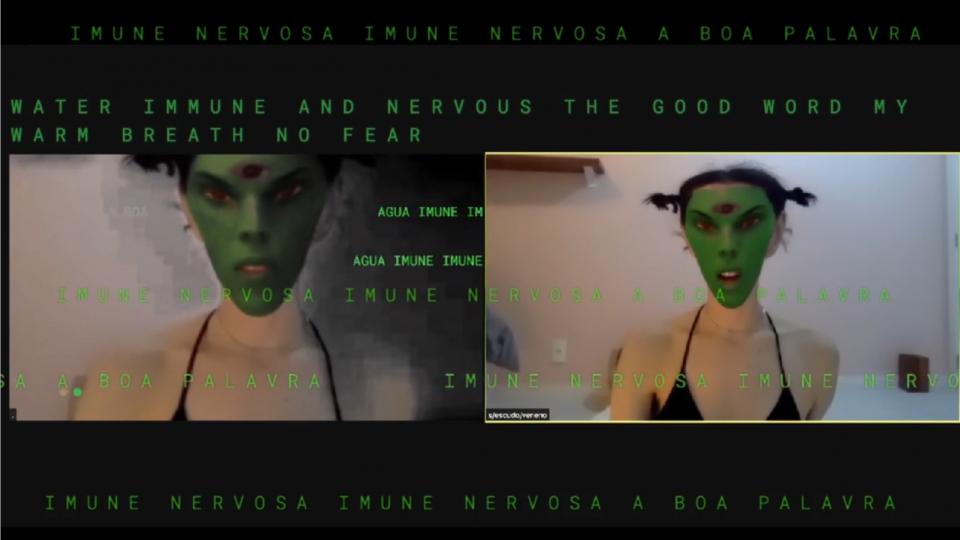
1000 Scores - virtuelle Residenz
Stimmen und Impressionen aus dem Projekt „1000 Scores - Virtuelle Residenz“
"Since I rely mainly on working or touring abroad, this has been suspended due to covid-19 lockdown. It (the residency) has helped me secure income during my lockdown in Egypt. The commission of 1000 scores helped me think of new ways of addressing the audience as makers and finding a new area between writing and performance. The curatorial work gave me an opportunity to officially try to improve my curatorial skills which is a new terrain to me since I have only one other professional experience as a curator." - Laila Soliman
"Das Stipendium hat einen intensiven Dialog mit Laila Soliman und den von ihr kuratierten Künstler:Innen über künstlerische Strategien und Haltungen in Zeiten großer Restriktionen und Repressionen eröffnet und ermöglicht: Pandemie zu einem - politische Systeme zum anderen. Dabei war auch ein wesentlicher Aspekt, wie sich Künstler:Innen gegenseitig motivieren und unterstützen können; sowie welche Reichweite die Arbeiten erlangen können, mit wieviel Spielfreude sie in einem wachsenden globalen Netzwerk aufgenommen werden, durch große Solidarität getragen. Die Idee Laila nicht nur als eigenständig arbeitende Theatermacherin zu unterstützen, sondern ihr auch die Rolle der Kuratorin zu geben und sie und ihr Netzwerk zu unterstützen, ging meiner Einschätzung nach voll auf. Das Stipendium war eine Grundsteinlegung - ich bin gespannt welch wunderbare Räume darauf aufgebaut werden können. Vielen Dank!" Helgard Haug (1000 Scores)
Gefördert durch die virtuellen Residenzen stellte Laila Soliman einen Beitrag für das Projekt 1000 Scores von Rimini Apparat zur Verfügung und kuratierte weitere Scores. Zu sehen sind sie hier: 1000scores.com/
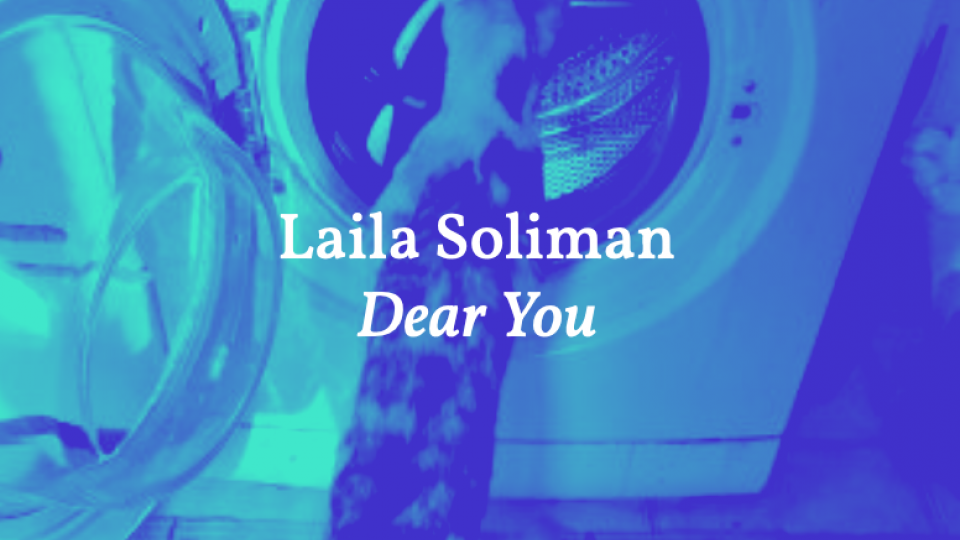
Beyond the Southern Grasslands
Stimmen und Impressionen aus dem Projekt „Beyond The Southern Grasslands“
"Beyond The Southern Grasslands was a 3-month virtual residency program hosted by SAVVY Contemporary Berlin through funding from the Martin Roth-Initiative (MRI). During the residency, artists Chantal Edie Ntube and Boris Anje Tabufor were invited to reflect on the ongoing crisis in the English-speaking regions of Cameroon, and together find ways through which the situation could be improved through the arts. A series of activities such as workshops, exchange sessions were organised between the artists, different target groups amongst the internally displaced, and were all coordinated with the help of cultural workers and professionals on the ground. Due to the pandemics, these activities were restricted to a limited number of people and were all carried out under strict hygienic measures. During the residency, information and material were collected in the form of pictures, drawings, fabrics ...etc. All the collected material will serve the purpose of building a visual archive. Through this archive we aim at inviting people to take a critical look at the ongoing crisis, and together through and with the help of the collected material engage, reflect, and suggest non-violent ways through which the crisis could be ended and the lives of the internally displaced and those in the crisis regions bettered. This archive will also serve as the foundation / starting point for further research and long-term discourse around the crisis, which we would like to initiate as hopefully the crisis soon comes to an end and the people can engage on the difficult path of collective healing." Savvy Contemporary
"The 3-month virtual residency I and my colleague Boris Anjecarried out with Savvy Contemporary under the funding body Martin Roth Initiative was an experience that I would like to do again. Our Residency consisted of researching, documenting, and carrying out Art therapy workshop with Internally Displaced Women and children in the city of Douala, Cameroon. It was an experience that proved the importance of the ARTS in humanizing the world, our world. The Children and women found a safe haven where they were taught to learn, create, and speak out about themselves. It was a life-evolution experience for me and Boris as well, as we grew up mentally and creatively throughout the whole residency procedure. We would like to plan for an exhibition centering on the archives we gathered during this virtual residency. Many thanks to Savvy Contemporary, Many thanks to Martin Roth Virtual Residency for keeping us creative during the Pandemic." Chantal Edie Ntube
"Obtaining the MRI scholarship has gone a long way into helping me get closer to thefragile people, weakened by the ongoing crisis in our country. It came as a wave of hope to us,as we approached the population with a peaceful and creative way of handling their fears through arts. Having meaningful discussions around erasing frustrations and living a better and healthier life in this time of the crisis and the pandemic were at the core of our different encounters. The funding came as a relief magnet, as I had the possibility to concentrate solely on the residency, and develop a new narrative around my people." Boris Anje Tabufor
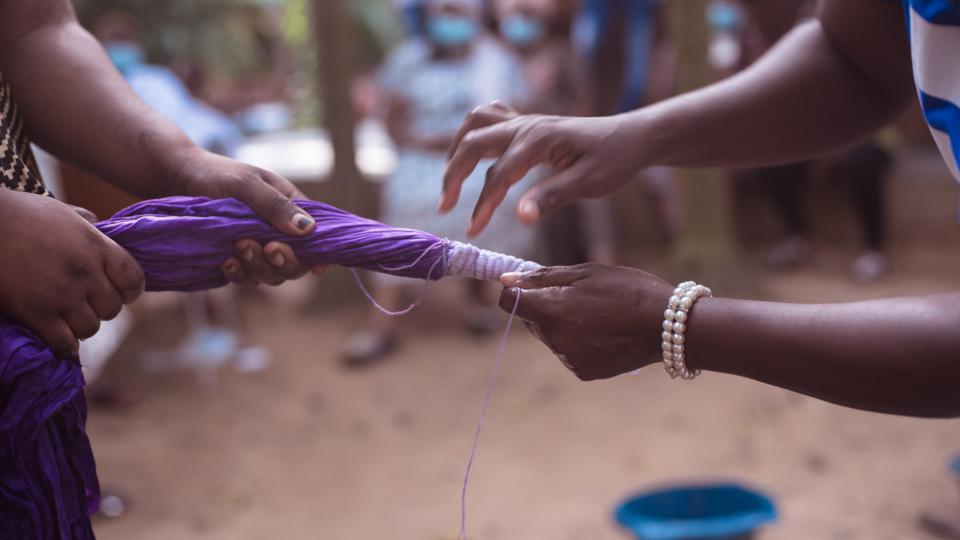
Congress of Idling Persons und The Epoch of Mapalucene
Stimmen und Impressionen aus den Projekten "Congress of Idling Persons" und "The Epoch of Mapalucene"
“Die fünf Gesprächspartner*innen in Congress of Idling Persons stellen sowohl sich selbst als auch größere Fiktionen im Rahmen weiter gefasster transhistorischer Narrative dar. Im Schatten der jüngsten welthistorischen Ereignisse entwerfen der Künstler und Schriftsteller Bassem Saad, der DJ und Übersetzer Rayyan Abdel Khalek, die Sängerin und Performerin Sandy Chamoun, die Schriftstellerin Islam Khatib und die Organisatorin Mekdes Yilma eine Kartografie des Protests, der Krise, humanitärer und gegenseitiger Hilfe, Arbeitsmigration und palästinensischem Außenseiterstatus. Immer wieder von den Ereignissen des jüngsten Arabischen Frühlings, der Black-Lives- Matter-Proteste 2020 sowie der Explosion im Beiruter Hafen durchbrochen, webt sich der Film angetrieben durch die Reden und Handlungen der Performer*innen durch transhistorische Konstanten, die von kollektiver Wut bis hin zu Mutualismus reichen. Mit dieser Arbeit stellt Saad die Frage: Wenn eine Gruppenaktion ein Aufstand und keine Revolution ist, wer filmt sie dann? Wenn vier ein Aufstand sind, sind sie dann auch ein Kongress? Bassem Saad ist Künstler, Schriftsteller und Architekt, geboren an einem 11. September. Seine Arbeiten erforschen Objekte und Vorgänge, die Gewalt und Lust, Fürsorge und Abfall thematisieren. In Form von Videoarbeiten, Skulpturen oder Texten untersucht er Strategien, um sich innerhalb und jenseits von Regierungssystemen zu bewegen.” - Transmediale
"The fund I received from the MRI formed the greater part of the budget for Congress of Idling Persons. With the fund, I was able to purchase and rent equipement, book locations, and pay the performers assistants, sound designers, and translators. The film would not have been possible without it, especially in the context of the pandemic and given the current economic situation in Beirut." - Bassem Saad
“In der indonesischen Provinz Nordsulawesi sind die Minahasa, in deren Kultur Steine eine große Rolle spielen, nach der Gabenkökonomie des Mapalus organisiert, die auf Freiwilligkeit, Verwandtschaft mit der Natur und gegenseitiger Hilfe beruht. Laut der indigenen Kosmologie war der erste Mensch, der je existierte, eine Frau, die aus einem Stein geboren wurde. Mit der Präsenz der westlichen Kolonialisator*innen und ihrem Kontakt mit der lokalen Bevölkerung entwickelten die Minahasa ein Tauschsystem mit Steinen, das geprägt war von einer Mischung aus ihren alten, spirituellen Überzeugungen und den christlich geprägten kapitalistischen Ideen. The Epoch of Mapalucene erforscht die Dynamik der Minahasa-Weltanschauung aus der Perspektive der digitalen Kultur heraus und hinterfragt ihr Potential sich eine alternative Gesellschaft vorzustellen, in der die belebte und unbelebte Welt durch das Prinzip von Gegenseitigkeit zusammengebracht werden. Natasha Tontey (Yogyakarta) ist Künstlerin und Grafikdesignerin. In ihrer Arbeit verwendet sie Fiktion als eine Methode spekulativen Denkens und geht der Frage nach, wie Angst, Horror und Terror dafür instrumentalisiert werden können, die Öffentlichkeit zu kontrollieren.” - Transmediale
"During my residency with Martin Roth Initiative and transmediale, I had time and resources to develop my long term research and ideas on the fictional account of the history and myth surrounding ‘manufactured fear’ and speculative fiction - in this case, with a focus on the Minahasan cosmology and its deep connection to the history of colonialism. During the process, I encountered many stories that were relevant to my topics of interest, and which built a field to be explored through my artistic practice. I also carried out a reflection on how to develop the ideas into a digital practice. I sometimes had to do field research and to look up documents regarding the notion of ‘fabricated fear’, perpetuated by colonial history as well as through the contemporary suppression of the indigenous practice of stone culture in Minahasa. At the same time, I had the opportunity to work with the idea of ‘commoning’ and with the concepts of the stone economy in a process of critical reflection. Moreover, I had a chance to build stronger relationships with individuals from the indigenous people of Minahasa and to develop a new approach to my ancestral roots.
During these past few years, I have been interested in exploring the concept of fiction as a method of speculative thinking. Through my artistic practice, I investigated the idea of fear, horror, and terror being manifested in order to control the public. From 2014 to 2017, I worked on a practical-horror project in which I used trigger mechanisms in order to look at the various sources of fear. In this context, I organised a performative action called ‘Makan Mayit’, or ‘Fresh Flesh Feast’ in English, during which I conducted a private dinner in a theatrical way. This project went viral and I then had to face bullying from the public, because my work went against the main norm in Indonesia. I almost faced a sentence and an Indonesian government minister publicly condemned the project. I felt really anxious to present my work in Indonesia after that particular event and began to self censor myself. Working with the support of MRI made me feel a lot safer, especially in the context of this global pandemic, in which everyone is facing unprecedented times, and also because of my current topic of research. Indeed, the cosmology of the indigenous people of Minahasa is considered as a marginalised practice, a heresy, by most of the population in Indonesia. It is important to do field research and to not only speculate inside my own bubble. Visiting Minahasa during the MRI residency a few months ago broadened my knowledge, since the sharing experience is invaluable. Through this experience, I could expand my personal perspective in understanding the Minahasa worldview, as well as develop my artistic endeavour and study my ancestral roots with a critical stance. Through transmediale, I hope to be able to present my work and ideas to a larger audience and with a critical perspective." - Natasha Tontey
Gemeinsam mit den beiden KünstlerInnen erarbeitete die Transmediale im Rahmen der virtuellen Residenzen zwei Videoarbeiten. Congress of Idling Persons ist hier zu sehen. Ein Momentaufnahme aus The Epoch of Mapulence sehen Sie hier.
